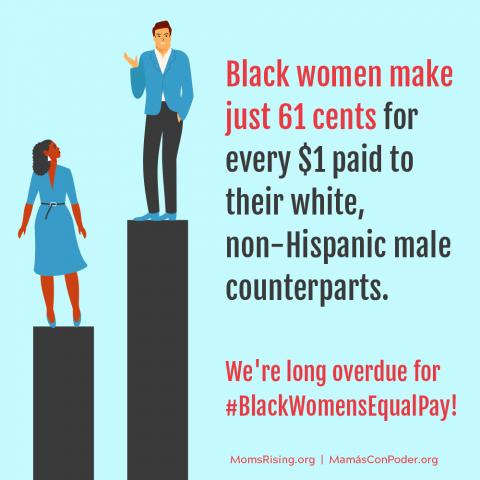
August 22nd: Black Women's Equal Pay Day
Today isn’t just any Thursday. Today is Black Women’s Equal Pay Day, marking the fact that Black women must work until August 22 of 2019 (and all of 2018) in order to earn what white men were paid in 2018 alone. Put another way, Black women who work full-time, year-round, face a 39 cent wage gap. Black mothers are paid even less. On average across the country, Black mothers earn 54 cents on the dollar compared to white fathers.
The U.S. House of Representatives PASSED the Paycheck Fairness Act months ago to help close the wage gap, but the U.S. Senate is majorly stalling! New research from the Center for American Progress found that the U.S. Senate’s lack of action on the Paycheck Fairness Act has already cost Black women, on average, more than $4,628 each in wages.
>>> This is unacceptable, so we’re joining together to fight back against this injustice and call attention to the real cost of U.S. Senator Mitch McConnell’s legislative graveyard because Black women and their families can’t wait any longer for equal pay!
Let’s be clear: The Black women's wage gap is the result of and perpetuated by not only sexism but also by racism. And there are over 23 million Black women in America who are dealing with this wage gap.
The U.S. House of Representatives PASSED the Paycheck Fairness Act on March 27th of this year; and yet the U.S. Senate has shown zero signs of movement on this bill.
It’s outrageous. And we have to talk about it and fight back, and to do that you need to know the facts. Black women are now the most educated group in the United States, but face a raging wage gap fueled by racism and sexism. We can (and must) fight back -- and policies like the Paycheck Fairness Act will help.
Black women and mothers are facing direct discrimination on a number of levels -- and this is not okay. On top of the wage gap, there’s a lot at stake right now for Black women and mothers in our nation. For instance, we can’t ignore the fact that deaths related to childbirth and pregnancy are rising in the United States, and are especially high among Black women. A recent study showed that “the impacts of institutional racism and sexism compromise women’s health across time, leading to poorer outcomes for African American women and infants.”
To be clear, Black women are not only experiencing increased pay discrimination but are also experiencing increased discrimination in health care as well as targeting and profiling from the criminal justice system every day. This racial bias starts early -- really early -- when children of color are more likely than white students to be suspended from school.
And racial bias follows Black women throughout their lives. For example, Black women accounted for 53.4 percent of all women stopped by the police even though Black women only make up 12.7% of the female population in the US. Further, studies show that Black women are three to four times more likely to be targeted by police and incarcerated than white women.
The racism that Black women face truly impacts the whole family. Despite myths to the contrary, Black fathers are more present and involved with their children than any other group of fathers. Having said that, the fact is that racial profiling, mass incarceration, and the fact that young Black men are 21 times more likely to be killed than young white men means that many Black women and mothers are left to pick up the pieces and serve as sole breadwinners for their families.
With more than four million family households in the United States headed by Black women -- and more than 80% of Black mothers being key breadwinners for their families, it’s imperative that we close the Black women’s wage gap.
When Black women are paid fairly, there will be a ladder to economic security and greater opportunity to develop a financial cushion to address child care and other family emergencies.
Closing the wage gap for Black women would mean that on average, a Black woman working full-time, year-round would have enough money for approximately: 2.5 more years of childcare, more than 2.6 additional years of tuition and fees for a four-year public university or the full cost of tuition and fees for a two year community college, 165 more weeks of food for her family, 15 more months of mortgage and utilities payment, or nearly 23 more months of rent.
Together, we are a powerful force in closing the Black women’s wage gap!




The views and opinions expressed in this post are those of the author(s) and do not necessarily reflect those of MomsRising.org.
MomsRising.org strongly encourages our readers to post comments in response to blog posts. We value diversity of opinions and perspectives. Our goals for this space are to be educational, thought-provoking, and respectful. So we actively moderate comments and we reserve the right to edit or remove comments that undermine these goals. Thanks!